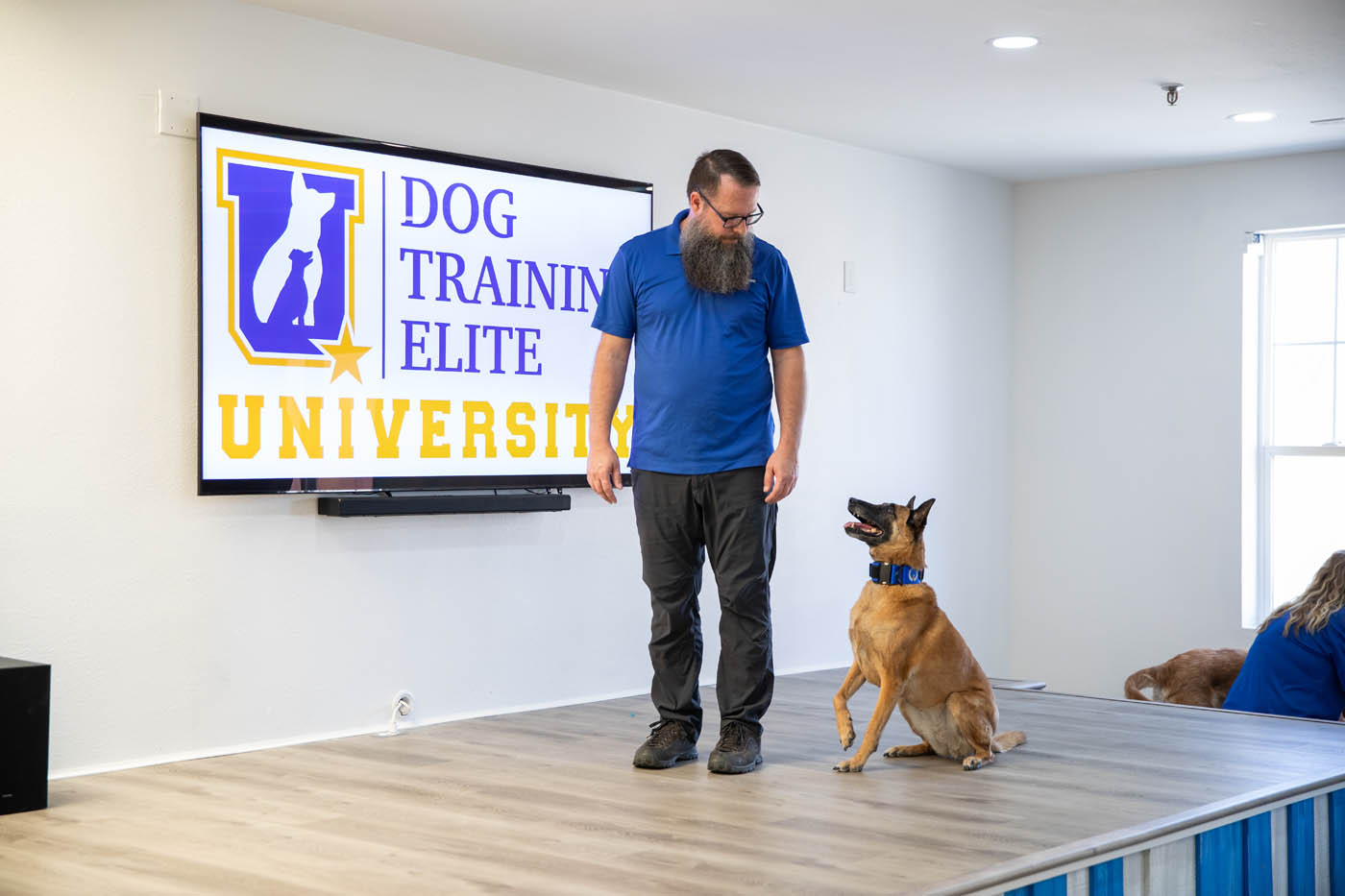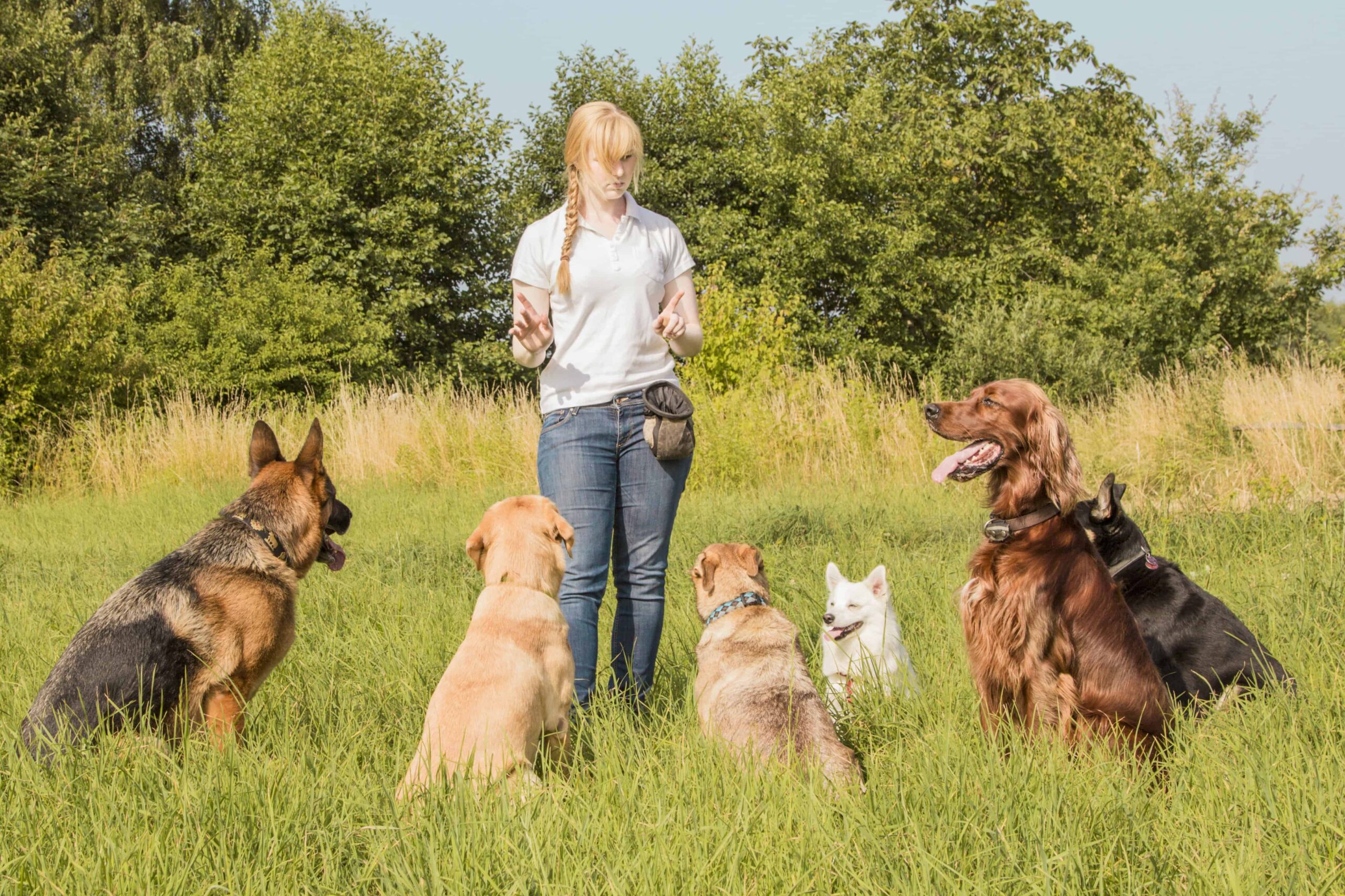Unlock the Secrets of Effective Dog Training Near Me for a Better Pet
Unlock the Secrets of Effective Dog Training Near Me for a Better Pet
Blog Article
Unlock Your Pet's Possible: Proven Pet Dog Training Methods for Success
Reliable pet dog training is a nuanced process that hinges on recognizing canine behavior and using clinically backed techniques. By integrating positive reinforcement, establishing clear commands, and focusing on socializing, pet dog proprietors can cultivate a productive partnership with their pets.
Understanding Pet Dog Actions
Understanding canine behavior is vital for reliable training and cultivating a favorable relationship in between canines and their owners. A comprehensive understanding of canine body language, vocalizations, and social interactions is essential for acknowledging their needs and feelings. Pets communicate mostly via non-verbal cues; for example, a wagging tail might show excitement, while pinned ears can signify concern or entry.

In addition, environmental elements play a substantial function fit a dog's habits. Changes in regular, brand-new environments, or the visibility of unfamiliar people can result in anxiety or stress and anxiety in pet dogs. Identifying these triggers makes it possible for owners to mitigate damaging responses and create suitable training methods.
Ultimately, a deep understanding of dog habits lays the structure for successful training methods, boosting both actions and the total bond between the dog and its proprietor. dog training charlotte nc. This knowledge is crucial for cultivating a well-adjusted, satisfied canine buddy
Favorable Reinforcement Strategies
Efficient training depends greatly on positive support techniques, which have actually been shown to generate significant results in shaping preferred habits in dogs. This technique involves awarding a pet for exhibiting particular behaviors, therefore boosting the chance that these behaviors will be repeated. Incentives can take numerous kinds, consisting of treats, appreciation, toys, or playtime, depending on what encourages the specific pet dog.

It is important to gradually phase out rewards as the dog finds out the behavior, transitioning to recurring support. This strategy keeps the habits in time while protecting against dependence on continuous incentives. By focusing on positive support, trainers can cultivate a trusting partnership with their pets, promoting a participating and healthy and balanced training atmosphere that improves overall obedience and performance.
Establishing Consistent Commands
A basic element of successful pet training is the establishment of consistent commands. Consistency in commands is vital for reliable communication in between the pet and the trainer. When commands are consistent, pets discover to associate certain words with preferred behaviors, which speeds up the training procedure and enhances understanding.
To develop consistent commands, it is important that all relative make use of the exact same terminology and motions. As an example, if someone makes use of "sit" while another says "rest down," it can develop confusion for the canine. Select clear, distinctive words for commands and make certain every person involved in the pet dog's training complies with these choices.
Enhance commands through constant technique, making sure that the canine gets sufficient possibilities to react appropriately. When a dog efficiently adheres to a command, instant positive support needs to comply with.
Lastly, be patient. Establishing consistent commands requires time and effort. With dedication and quality, you will certainly aid your canine create a solid click to read understanding of expectations, ultimately resulting in a well-behaved buddy.
Socializing and Direct Exposure
Mingling a dog is important for cultivating go to website a certain and well-adjusted companion. This process entails subjecting your pet to a selection of environments, people, and various other animals to develop their social skills and adaptability. Early socialization, preferably between the ages of three to fourteen weeks, is crucial, as it lays the foundation for a pet dog's future habits.
During socialization, goal to provide positive experiences in various settings, such as parks, active roads, and homes with various other pets. Present your pet dog to numerous stimulations, consisting of noises, views, and scents, ensuring that each encounter is satisfying. This exposure assists mitigate fear and anxiousness, leading the method for a much more durable dog.
Engaging in controlled group play sessions with various other pets can additionally enhance social abilities, educating your family pet suitable communications and borders. Focusing on socializing will significantly contribute to your pet dog's overall happiness and habits throughout their life.
Conquering Common Educating Challenges

One more regular concern is diversion. Pets may have a hard time to focus in unfamiliar or active setups. Gradually desensitize your dog to interruptions by starting training in a peaceful setting and slowly presenting more stimulations as they become skilled (dog training near me). Positive support strategies, such as deals with and appreciation, can maintain motivation and focus.
Furthermore, behavior problems like leaping or excessive barking can become irritating. Address these by educating different habits, such as sitting smoothly when welcoming guests. Uniformity and patience are essential; enhance desired behaviors regularly and avoid abuse, which can cause confusion.
Lastly, see this site acknowledge that each dog is distinct, and training timelines might differ. Dressmaker your strategy to your dog's individual requirements, and seek expert support if necessary. With willpower and the best techniques, getting rid of these challenges can result in a well-trained, delighted canine buddy.
Conclusion
Finally, opening a pet dog's possible necessitates a detailed technique that integrates an understanding of canine habits, the application of favorable reinforcement techniques, and the establishment of consistent commands. Early socialization and exposure to varied environments even more boost a pet's adaptability and self-confidence. By resolving common training obstacles with tailored approaches and persistence, a unified and participating partnership between pet dog and trainer can be cultivated, eventually leading to a well-behaved friend qualified of thriving in numerous situations.
Reliable dog training is a nuanced process that hinges on comprehending canine behavior and using medically backed techniques.Comprehending pet actions is crucial for effective training and promoting a positive connection in between pets and their proprietors.Efficient training counts greatly on positive reinforcement methods, which have actually been revealed to produce considerable results in forming desired behaviors in pet dogs. When commands are consistent, canines learn to link details words with preferred actions, which accelerates the training procedure and enhances understanding.
In conclusion, opening a canine's potential requires a thorough method that includes an understanding of canine actions, the application of positive reinforcement strategies, and the establishment of regular commands.
Report this page